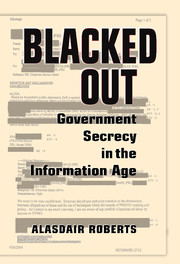3 - Regime Change
Published online by Cambridge University Press: 05 June 2012
Summary
On April 22, 2004, U.S. Defense Secretary Donald Rumsfeld gave a luncheon address to the annual convention of the American Society of Newspaper Editors, meeting at the J. W. Marriott Hotel on Washington's Pennsylvania Avenue. Fifty years earlier, it had been the ASNE that first lobbied for adoption of a federal Freedom of Information Act, and so it was perhaps natural for Rumsfeld to begin with an encomium on the virtues of open government:
Our republic was founded on the notion that an unchecked government is a major obstacle to human freedom and to progress, and that our leaders need to be challenged, internally through the complex constitutional system of checks and balances, and externally by a free and energetic press. This is a notion I've supported throughout my adult life. As a matter of fact, as a young member of Congress back in the 1960s, still in my 30s, I was a co-sponsor of the Freedom of Information Act. Now we all recognize that that Act causes government officials occasional pain, but in my view, it has been a valuable Act in helping to get the facts to the American people…. Our great political system needs information to be self-correcting. While excesses and imbalances will inevitablyexist for a time, fortunately they tend not to last. Ultimately truth prevails.
The depth of Secretary Rumsfeld's commitment to transparency was, at that moment, open to question.
- Type
- Chapter
- Information
- Blacked OutGovernment Secrecy in the Information Age, pp. 51 - 81Publisher: Cambridge University PressPrint publication year: 2006

